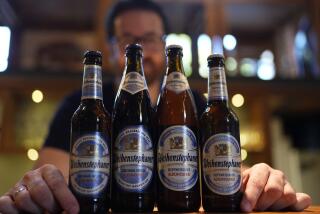In Europe, It’s a Battle of the Buds
- Share via
CESKE BUDEJOVICE, Czech Republic — Back when men were men, beer was the color of molasses, and mugs were made of stoneware or pewter, someone in the Bohemian town of Pilsen found a way to make yeast sink harmlessly to the bottom of the fermentation vat. Thus was born the world’s first pale lager, a chic new drink that was to launch a thousand clear-glass schooners.
Pilsener, first produced in the 1840s, should have made its hometown rich, but by the time anyone in Bohemia thought to license the name, the dray horse was out of the barn.
Brewers here in Ceske Budejovice, another Bohemian mountain city renowned for its beer, are determined not to let that happen to them.
In the days when the kingdom of Bohemia was part of the Austro-Hungarian Empire, people here spoke German and this town’s name was Budweis.
There was a local brewery, and the output was, sensibly enough, called Budweiser.
“You had cognac made in the province of Cognac and champagne made in Champagne,” points out Petr Jansky, financial manager of the Budejovicky Budvar brewery.
For him, logic is logic: Even though the empire is long gone and the city’s name has reverted to the original Czech, the beer from here is still Budweiser.
And only the beer from here. In a David-and-Goliath routine par excellence, the small, state-owned Budejovicky Budvar brewery is duking it out with Missouri’s Anheuser-Busch Cos. in courts all across Europe, claiming the right to reserve the names “Budweiser” and “Bud” for its brew, in much the same way the French have so jealously--and lucratively--reserved the name “Champagne” for their top-franc sparkling wines.
“This is something Americans should understand,” Jansky says, “for it is in the tradition of your great country to have a brave and capable little company fighting against a big opponent.”
Mighty Anheuser-Busch--which controls 45% of the U.S. beer market and 8.5% of the world market, with sales in more than 80 countries--says the dispute poses no threat to its finances, growth or international marketing strategy. Its advertising budget alone is bigger than Budejovicky Budvar’s entire annual revenue.
But Bud vs. Bud can certainly cause confusion for the beer drinkers of Europe. With the matter before trial and appellate courts in more than 20 countries, it’s impossible to belly up to a bar anywhere on this continent and know, with confidence, which Bud’s for you.
Demand a Bud in Switzerland and you’re apt to be handed a frosty glass of the Czech version; a lower court ruled in December that Anheuser-Busch could no longer sell its flagship beer there under that name. In Denmark, by contrast, calling for a Budweiser will get you the lighter American stuff, thanks to a December injunction prohibiting the Czechs from including that word on their labels in Denmark.
In the Czech Republic, calling for a Bud will get you the domestic brew. But in Britain, a drinker who orders Budweiser has no way of knowing what he’ll get, because her majesty’s courts have agreed to let the two names coexist.
The British Trade Marks Registry office does permit Anheuser-Busch the exclusive use of the slogan “King of Beers”--even though Budejovicky Budvar likes to call its Budweiser the “Beer of Kings.”
In Germany, the jewel in the European beer marketer’s crown, use of the word “Bud” is still under adjudication. But while the judges deliberate, Budejovicky Budvar has been free to use “Budweiser,” and its brew has blossomed into the third-largest import. Anheuser-Busch is meanwhile striving to close the gap with a beer labeled, simply, B.
These courtroom battles are but the latest phase in a dispute that goes back more than a century. World wars have been fought, the Iron Curtain has been thrown up and dismantled, breweries have been bombed, occupied and nationalized--and, still, Bud vs. Bud marches on, providing a textbook study of cross-cultural incomprehension.
A Dark Parable?
Seen from America, Bud vs. Bud is a nifty compendium of the fundamentals of Marketing 101: the incalculable value of bringing to life an “icon” brand and the need to defend it to the death.
But here in the cradle of Bohemian brewing, the case is seen as a dark study in the way America steals other people’s cultural props and mass-merchandises all the charm away.
“Anheuser-Busch will never be able to make the Budweiser trademark into another big brand like Marlboro or Coca-Cola” in these parts, says Jansky, “because they are really impostors.”
He is unsparing in his contempt for American Budweiser, which is, indeed, lighter and fizzier than Budejovicky’s rich, traditional Bohemian lager. Anheuser-Busch retorts that it makes American Bud “less bitter and more drinkable” on purpose, because that’s what Americans prefer.
“These are two different products, enjoyed by two different groups of people,” says Steve Burrows, president and chief operating officer of Anheuser-Busch International Inc.
The story dates to the middle of the last century, when American brewer Adolphus Busch, a German immigrant, scouted Europe hoping to crack the secrets of the popular new lager-making technique pioneered in the Bavarian Alps. He made his way to Budweis and was impressed enough by the goings-on there to name his own beer Budweiser.
Name Is Licensed
Unlike the hapless brew-meisters of Pilsen, Busch had the foresight to license the name in America in 1876--and subsequently around the world.
Nineteen years later, Budejovicky Budvar fired up its copper kettles. And a few years after that, it began shipping small amounts of Budweiser to the United States, prompting Anheuser-Busch to seize the legal high ground and cry trademark infringement.
“Anheuser-Busch believes it has the trademark, simply stated, because we deserve it,” Burrows says. “We’ve invested millions and millions of dollars in this trademark over the last 120 years. It has been built into a worldwide global icon by us.”
Icon, schmicon, say the Czechs: It was our name first, and Adolphus Busch filched it.
In 1911, the two Bud-meisters reached a truce. Budejovicky Budvar would use the name Budweiser in Europe, while Anheuser-Busch was free to do business with it in the rest of the world.
But the deal cracked. There were always new markets to move into, countries not covered by the 1911 compact. Anheuser-Busch was by then consciously developing its Budweiser into the world’s first mass-market beer, and it didn’t like the way Budejovicky Budvar kept printing the word “Budweiser” in larger and larger typeface on its own labels.
By the time World War II was breaking out, the 1911 agreement was history.
“Ceske Budejovice was surrounded by the tanks of the German Wehrmacht,” Jansky says, walking to the window of his office and pointing out over the city rooftops to the hills beyond. “If it were not so foggy, I would show you the place from which the onslaught started.”
The Germans rolled into town, seized the brewery and installed their own managers in the front office. The Czech management was forced into exile in America, Jansky says, and its members took what assets they could with them. But once in America, he says, they soon found Anheuser-Busch threatening to have their assets seized by the courts unless they acquiesced in a new division of world markets.
“Budejovicky Budvar was at its worst moment,” he says. “Anheuser-Busch cruelly made use of this wartime situation to force a new agreement. But this isn’t surprising. It only illustrates the methods with which Anheuser-Busch routinely proceeds.”
Burrows says he has no knowledge of these events, but he adds that Jansky’s description is “consistent with what I would describe as stretching the truth.”
In any case, the two brewers entered the postwar 1940s with a new deal, in which Anheuser-Busch got the rights to the United States and Latin America and Budejovicky Budvar got the rights to Europe and the Soviet Bloc.
This arrangement, too, cramped the parties. Anheuser-Busch soon tried to work its way into Europe through the courts, and Budejovicky Budvar began to register the name “Bud” from Vienna to Hanoi.
And then down came the Berlin Wall. The once-closed East European borders--and markets--were thrown open to the West. The newly democratic Czechoslovakia started selling off thousands of state enterprises to private investors.
It looked like a rare opportunity for the two Budweisers to kiss and make up. A moratorium on lawsuits was agreed upon. Negotiations began for Anheuser-Busch to buy a stake in Budejovicky Budvar, providing needed capital in exchange for control of the name Budweiser.
Anheuser-Busch has never said how much the trademark settlement deal was worth, but Budejovicky Budvar executives claim the American brewery offered a package worth $232 million.
To sweeten the deal, Anheuser-Busch dangled some choice bits of Americana before the people of Ceske Budejovice. A $1-million community center, called the St. Louis Center, went up just off the town square. Basketball hoops appeared alongside the medieval fountain. Baseball leagues were organized, English classes taught, Internet surfers offered the use of personal computers. There was even a Cafe St. Louis, selling a Czech beer called Samson, because Anheuser-Busch can’t sell its Budweiser here, and it wasn’t about to retail the local Bud.
“We wanted to put a face on our company,” Burrows says. “We were always viewed as this big, evil company.”
Talks Break Down
But however much the townspeople took advantage of the English lessons and other largess, they refused to fall into the arms of the Americans. Mindful of the U.S. tendency toward business consolidation, they feared that if Anheuser-Busch got its hands on Budejovicky Budvar, their esteemed Bohemian beer might disappear.
“Anheuser-Busch would be happiest if the name of our city, in Czech and German, disappeared from the map, along with the 700-year-old tradition of Budejovice beer,” alleges Budejovicky Budvar chief executive Jiri Bocek.
The negotiations broke down in 1996. Anheuser-Busch boarded up the St. Louis Center and headed back to Missouri--and to the courts. The never-ending dispute has left Budejovicky Budvar as one of the few Czech companies not to be privatized in the post-Communist era.
Burrows calls allegations that his company wants to wipe Ceske Budejovice off the map “silly.”
“You have to protect your trademark, because if you don’t defend it, you’re perceived as abandoning it,” he says, and given the course of intellectual-property jurisprudence around the world, that is indeed so.
But here in Ceske Budejovice, Jansky says he won’t give up either. The so-called appellation-of-origin laws that control the use of names like “Champagne” have been upheld by the General Agreement on Tariffs and Trade and its successor, the World Trade Organization, he says, suggesting that Anheuser-Busch rename its beer after something other than his hometown.
“If Anheuser-Busch starts producing ‘St. Louis Beer,’ we will not fight them on that,” he says.


